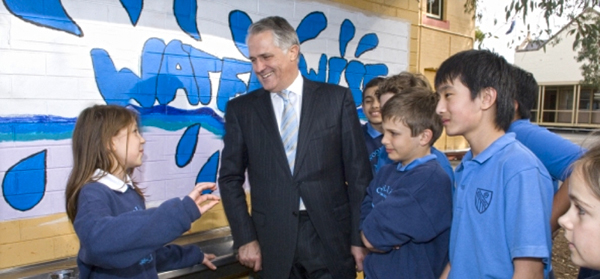Malcolm Turnbull has re-lit the climate fuse in the Opposition ranks. We’ll have to wait to find out whether it will all blow up in his face. [31 May 2011 | Peter Boyer]
Politics has its less newsworthy periods, but it’s never boring. Even in the quiet times you can be sure that behind the scenes something’s afoot. We got an insight into that when Malcolm Turnbull appeared on the ABC’s Lateline a couple of weeks ago.
The word “conservative” suggests a party that’s unchanging and colourless. Not true. Liberal allegiances are more fluid than Labor’s, which makes for some surprising twists and turns.
Tony Abbott’s brand of conservatism is a hard-nosed pragmatism based on a rigid Catholic orthodoxy. Malcolm Turnbull, equally active, ambitious and determined, is in all other respects Abbott’s opposite: an idealist whose thinking is underpinned by science and secularism.
Turnbull’s supporters have said he should sit and wait for Abbott to implode, but it hasn’t stopped him canvassing people in and outside his party, including independent MP Rob Oakeshott. This month’s announcement of strong British climate measures would only have fuelled his impatience.
It was against this background that he publicly voiced his contempt for Abbott’s climate policy. The policy, he told Lateline’s Tony Jones, was a “multi-billion dollar exercise” in which taxpayers’ money would be used to pay farmers to offset emissions by retaining and building soil carbon.
Jones quoted back to Turnbull from his 2009 speech supporting Labor’s emissions trading scheme: “I’ve always believed the Liberals reject the idea that governments know best. Schemes where bureaucrats and politicians pick technologies and winners. Doling out billions of taxpayers’ money is neither economically efficient, nor will it be environmentally effective.”
While not retracting what he’d said back then, Turnbull claimed on Lateline that he didn’t want to comment on Abbott’s direct action policy. “If you want a commentary run on it, you should ask Tony Abbott or [Opposition climate spokesman] Greg Hunt about it.”
Then he promptly ran his own commentary: “It is a policy where, yes, the government does pick winners, there’s no doubt about that, where the government does spend taxpayers’ money to pay for investments to offset the emissions by industry.”
Turnbull’s “defence” of his party’s climate policy was this: “If you believe climate change is going to be proved to be unreal, [or] if you believe that there is not going to be any global action — if you take that rather grim, fatalistic view of the future — a scheme like that is easier to stop.” In the long term, he added, it would be “a very expensive charge on the budget”.
So: Opposition policy serves the sceptics and the fatalists, will reward farmers with lots of taxpayer dollars, and can be dropped like a hot potato when it’s shown to be superfluous. Some endorsement.
It’s hard to know whether Turnbull’s comments were premeditated. They would have done nothing for his immediate prospects in the Liberal Party. He may have had a longer term strategy in mind, but we’ll have to wait to find out.
But his observations of the Abbott-Hunt “direct action” policy are both original and astute. Far from confining his thinking to his portfolio, he has clearly pondered long and hard about where his party is headed and what Australia needs to do to counter human-induced climate change.
Abbott, too, is concerned about his party’s future, but believes a climate action policy is a liability. He doesn’t believe mainstream science’s view on warming, preferring the advice of close party colleagues and two or three sceptical scientists, so he’s devised a policy that is not a policy.
Two other developments illuminate this odd situation in the Liberal Party. In the past fortnight the British Conservative government has undertaken to cut greenhouse gas emissions by 50 per cent below 1990 levels by 2027, and Australia’s Climate Commission has released The Critical Decade, its report on “climate science, risks and responses”.
A meeting with Britain’s Tory leader, David Cameron, influenced Turnbull’s 2009 decision to stake his leadership on climate policy. Cameron’s forthright policy is possible because the three major British parties support the science behind climate action. No such luck in Australia; hence the need for yet another science report.
The Critical Decade contrasted the “noisy, confusing” media debate with science’s strong understanding of the climate system. It said rapid warming of Earth’s surface was beyond doubt, and the likelihood that human emissions were the main trigger was now well above 90 per cent.
As the report’s title implies, significant emissions cuts in the years to 2020 are critical to containing warming to less than 2C. The report emphasised the need to cut global emissions to near-zero by 2050 and called for more ambitious targets for 2020 to allow a reasonable prospect of this.
Abbott noted the report’s support of carbon sequestration by land ecosystems. But he omitted to mention the crucial qualification that this was no substitute for cutting fossil fuel usage, and if poorly implemented could “lock in more severe climate change for the future”.
To a government struggling with its own carbon battles, the Abbott-Turnbull conflict offers little solace. Abbott’s “fight them on every front” strategy is keeping his critics at bay. He understands what Turnbull may not: that in the political cesspit winning is what counts, not policy.
A footnote: Turnbull, Hunt and Queensland’s Ewen Jones were the only Opposition MPs at last week’s Climate Commission briefing for politicians. About 30 Labor members were present.

